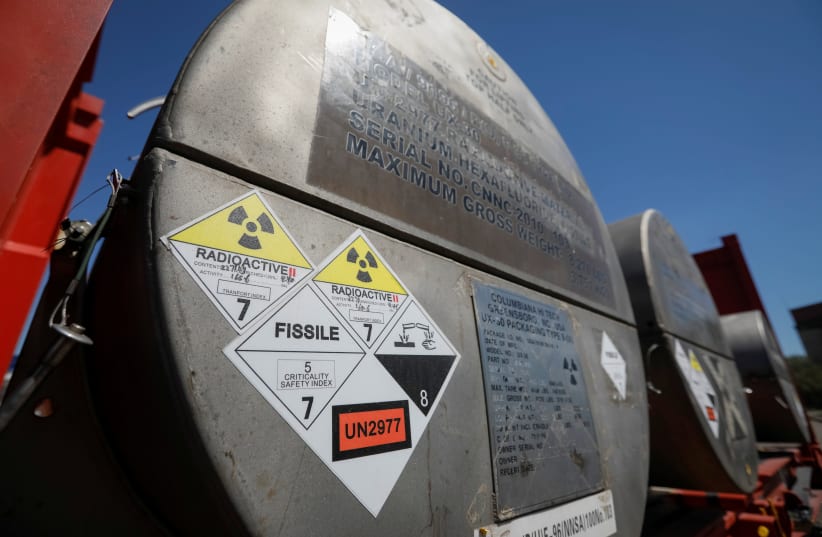Iran has enriched 24 tons of uranium since signing the 2015 JCPOA nuclear deal, said the head of the Atomic Energy Organization of Iran, Ali Akbar Salehi, on Sunday, according to Radio Farda.Tehran claimed that it had limited its stock of enriched uranium to 300 kg. as required by the JCPOA.Salehi has not explained exactly what he meant by his statement or what happened to the 24 tons of enriched uranium.The statement was made during a Sunday session of the “independent conservative” faction of the Iranian parliament discussing the latest developments concerning the nuclear deal. The faction is made up of close allies of Iranian Supreme Leader Ayatollah Ali Khamenei.“The fact is that when Iran enriches uranium, it must maintain a maximum of 300 kg. and deliver the rest to Russia,” political affairs analyst Reza Taghizadeh told Radio Farda. “From there, the uranium is sent to Kazakhstan and is stored in a bank installed by the International Atomic Energy Agency [IAEA]. Iran receives yellow cake [natural uranium] in return.”Salehi told parliament members about the enriched uranium in order to show them that Iran is in a position of strength and can go right back to where it was in the first place, according to Taghizadeh.The analyst stressed that 23 of the 24 tons of enriched uranium have been exported from Iran and only 300-350 kg. remain in the country.While the IAEA has verified that Iran breached the 3.57% enrichment limit in July and has exceeded the 300 kg. limit, no prior official indication has been made concerning a 24-ton stockpile.In a meeting between members of the nuclear deal on Sunday, all sides expressed commitment to keeping the JCPOA, while Iran’s senior nuclear negotiator Abbas Araqchi threatened that the Islamic republic would continue to reduce its commitments to the deal until Europe can secure Tehran’s interests.EU foreign policy chief Federica Mogherini said in mid-July that the five remaining parties to the deal do not see Iran’s breaches as significant non-compliance, and have not indicated any intent to trigger the accord’s dispute mechanism.Salehi also said on Sunday that progress was being made on the reconstruction project of the Arak heavy water reactor, according to Fars.“The joint committee for the reconstruction of the Arak reactor, including China and Britain, is doing well... We are satisfied with the progress of the plan,” he said, adding that “the plan has now been accelerated after a few months of hiatus.”The top nuclear official added that Britain has slowed down measures to redesign the reactor, and that if this continues, “Iran will return to the old reactor” which can also produce plutonium.The nuclear agreement guaranteed Iran access to world trade in return for accepting curbs on its nuclear program. Tehran says the deal allows it to respond to the US breach by reducing its compliance, and it will do so every 60 days.On Sunday, Russian Deputy Foreign Minister Sergei Ryabkov said that Iran is planning on further reducing its commitments to the nuclear deal by September 5, according to TASS.“Some participants [in the deal] think that Iran must get back to the implementation of its commitments in full without any additional reservations or conditions,” said Ryabkov. “But in the current situation, it looks absolutely unrealistic.”The deputy foreign minister added that no understanding has been reached on the issue of the Iranian Grace 1 tanker, which was seized in Gibraltar.“The topic of Gibraltar was touched upon,” he noted. “The problem of the detention of the tanker with Iranian oil was discussed quite energetically: I’d say fightingly.“I cannot say that this discussion was crowned by understanding, rather the opposite,” he added.“Anyway, it was useful from the point of view of clarifying positions.”Reuters contributed to this report.

